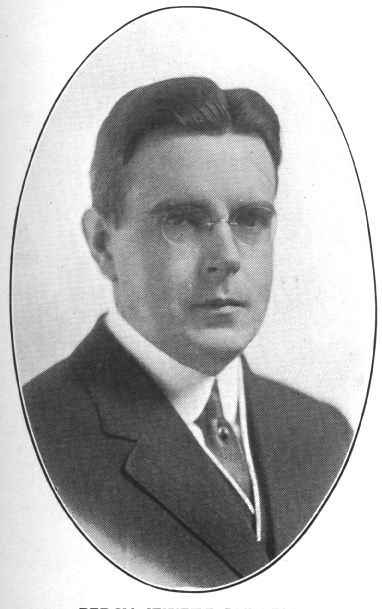Archives

Percy Jewett Burrell
(1877-1964)
The following selection is from Four Epochs of World Conquest by Oliver Huckel, published by the Missionary Education Movement of the United States and Canada, New York, 1913. Percy Jewett Burrell wrote the appendix to the book. In it, he offers comprehensive instructions for pageant participants. The book was intended to be performed dramatically, and Burrell was one of the country’s preeminent pageant masters of the time.
Much like the Fraternity’s Ritual, Burrell saw pageants as a force for instilling positive virtues, both in those viewing the performance and those who took part. At times, he spoke of nothing less than the triumph of the human spirit in all its potential when speaking of the good that was made possible through such performances.
The selection itself concerns rehearsals. The themes evident in its words are easily transferred to modern music rehearsals, or those for Fraternity functions. The clarity and depth of Burrell’s attention to such matters reveals just how seriously he saw our job as performers, and more specifically our job in relating positive ideals that could help to transform our world. Whether through music or another medium, our work has the potential to impart such ideals in others, for the benefit of all.
HOW TO FIND ENJOYMENT AND PROFIT IN A REHEARSAL
“The secret of happiness is never to allow your energies to stagnate.” – EMERSON
1. PROMPTNESS means to be a little ahead of time. Always bring your head with you, and keep it with you, for your confusion means more loss of time than your tardiness. Better be waiting for something to do than to keep somebody waiting for you before anything can be done. You take an important enough part to be prompt.
2. ATTENTION means your ears and your eyes. Believe yourself somebody, but do not think the other one nobody. Do not give advice, nor take it from any save the trainers. It means whispering and talk, and spells inattention. Your memory should be used for remembering, not forgetting. It discourages all to have attention count only during the time of rehearsal. Train the memory to pay attention between rehearsals, and remember the next week what you were told and taught the previous week.
3. WILLINGNESS. You may be prompt and be attentive and at the same time you may be indifferent and lazy. Your willingness to do — to work — is essential. It creates “atmosphere” and such a spirit of cooperation and good cheer permeating a rehearsal means everything. You will be happy if you use your energies for this good cause. Be willing to be corrected. Try in patience to learn to do.
4. WORK. Do not think you know it all in a few rehearsals. If you do, you are sure to fall down and drag others with you. Remember Euskin's words, “Conceit may puff a man up; it never props him up.” Work even if you get tired. Probably you will. It is a good sign. Do not tell your neighbor about your feelings. If you must speak of them, quietly tell a trainer after the rehearsal. Keep at your work and when you go out of doors and breathe God's fresh air you will forget that you are tired — you will be glad you have worked. It will help you to remember also Livingstone's motto, “Fear God and work hard.” It made him succeed. It will do the same for you.
The 50th anniversary of Burrell’s death is this upcoming March, and 2014 represents the 10th anniversary of when the Fraternity placed a marker on his gravestone in his honor.
For more of Burrell’s writings, including those specifically for a Fraternity audience, head to Sinfonia’s website at the following web link: http://www.sinfonia.org/Resources/writings/

